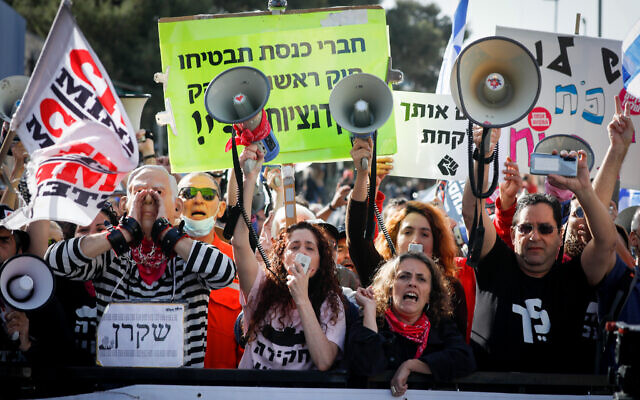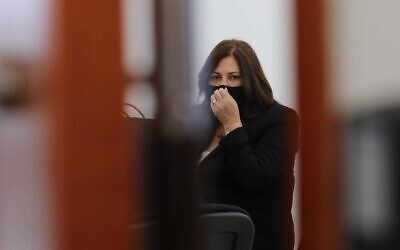Prime Minister Benjamin Netanyhau appeared before the Jerusalem District Court on Monday at the start of the evidentiary stage of his corruption trial, with the lead prosecutor in the case accusing him of “a severe case of governmental corruption.”
With his legal future up in the air, the Israeli leader’s political future was uncertain as well, as party representatives lined up at the President’s Residence across town throughout Monday to give their recommendations for the country’s next prime minister amid ongoing deadlock.
Opening statements
Lead state prosecutor Liat Ben-Ari opened the court proceedings with a speech in which she laid out the criminal charges against Netanyahu, describing the ways in which the prime minister allegedly abused the powers of his office in Cases 1000, 2000 and 4000.
Stressing that “every person is equal before the law,” Ben-Ari said that “the case before the honorable court today is a significant and severe case of governmental corruption.” The prime minister, she argued, used the “immense power of his office” to advance “his personal desires.”
“The relationship between Netanyahu and the defendants became currency, something that could be traded,” she said. “The currency could distort a public servant’s judgment.”

Prime Minister Benjamin Netanyahu sits with his lawyers at a hearing in his corruption trial at Jerusalem District Court, April 5, 2021. (POOL / AFP)
As the court hearing was held, hundreds of protesters supporting and opposing Netanyahu gathered outside the building, singing and chanting. Police kept the two camps separate.
Netanyahu denies wrongdoing in the cases, in which he has been charged with accepting improper gifts and seeking to trade regulatory favors with media moguls in exchange for positive coverage.

Protesters against Prime Minister Benjamin Netanyahu outside the District Court in Jerusalem, April 5, 2021. (Olivier Fitoussi/Flash90)
Inside, Ben-Ari told the court that Netanyahu acted “in order to demand and derive improper benefits from the owners of major media outlets in Israel, in order to promote his personal affairs, including at a time when he wanted to be reelected.”
Ben-Ari claimed Netanyahu “traded in his governmental power with businesspeople who own media bodies so that when he needed it, these strong media bodies would be available to him, and he would be able to win elections and affect his public standing.”
She said he abused his power “as a legislator and as a regulator, in order to cause or attempt to cause a media outlet to report in a different manner than it would have otherwise, solely to promote his personal matters.”

Supporters of Prime Minister Benjamin Netanyahu demonstrate outside the District Court in Jerusalem, as Netanyahu arrives for a hearing in his trial, April 05, 2021. (Olivier Fitoussi/Flash90)
The accusations against the premier, she added, “deal with the meeting point, the intersection, between the desire of businessmen to enjoy the prime minister’s immense powers of office and the prime minister’s desire to create an open door for himself to influence Israel’s central media bodies.”
Ben-Ari maintained that the indictment against Netanyahu “is based on a broad tapestry of evidence, including direct and circumstantial evidence. The material is also based on a unique type of evidence: recordings of calls as well as real-time text messages. All of these will clearly and fully prove that which is described in the indictment.”
Netanyahu’s attorneys attempted to raise objections following Ben-Ari’s opening remarks, but the judges rejected their complaints on procedural grounds.
“This isn’t the time,” Justice Rebecca Friedman-Feldman said.

Prosecutor Liat Ben-Ari (left) with colleagues at the trial of Prime Minister Benjamin Netanyahu at the District Court in Jerusalem, February 8, 2021. (Reuven Kastro/POOL)
Netanyahu left shortly after Ben-Ari finished her half-hour address, and before the start of testimony from the former editor of the Walla news site, Ilan Yeshua, a key witness in Case 4000, the most serious of the three cases against Netanyahu.
The prime minister was last week given permission to suffice with attending just the opening of the court session where he would hear the charges against him.
Yeshua testimony
Yeshua later told the court that during his time at Walla, he was instructed to play down negative articles about Netanyahu and his wife Sara and to boost stories that helped the premier.

Former Walla editor Ilan Yeshua enters a courtroom at the Jerusalem District Court for a hearing in Prime Minister Benjamin Netanyahu’s corruption trial, April 5, 2021. (Oren Ben Hakoon/Pool)
Yeshua said he was told by his superiors to put out “positive articles and stories about the prime minister and his wife and occasionally about his son, but mostly about the prime minister and his wife.”
In addition, he said he was told to “put out negative stories against rivals of the prime minister,” such as Yamina party leader Naftali Bennett. “We put out a series of articles against Bennett and his wife,” he said.
Yeshua said the directives to change coverage came from his superiors, including then-Walla owner Shaul Elovitch, who is also a defendant in the trial. Prosecutors are claiming the favorable coverage was part of a quid pro quo between Netanyahu and Elovitch in exchange for regulatory favors for the Bezeq telecommunications company, which Elovitch also owned.
Yeshua said requests on coverage also came from the Prime Minister’s Office itself through emails and text messages.

Iris Elovitch, one of the defendants, attends a session of Prime Minister Benjamin Netanyahu’s trial for corruption at Jerusalem District Court on April 5, 2021. (Oren Ben Hakoon/Pool)
He said Elovitch and his wife Iris, also a defendant, couched their demands for positive coverage for the premier in ethical and political terms.
“They would say: ‘What are you, the [liberal] Haaretz newspaper? What are you, a website for leftists? What are you, a website for Hamas members?’” Yeshua recalled.
Yeshua said there were constant fights about such demands, but that “90 percent” of them were accepted in the end.
Case 4000

Defendant in Case 4000, Bezeq owner Shaul Elovtich, at the Jerusalem District Court, April 5, 2021. (Oren Ben Hakoon/Pool)
In Case 4000, Netanyahu allegedly used his powers when he served as both premier and communications minister from 2014 to 2017 to illicitly benefit telecommunications magnate Elovitch, the controlling shareholder of Bezeq telecom, in exchange for positive coverage of the prime minister and his family by the Bezeq-owned Walla news site, one of the most popular outlets in Israel. Elovitch and his wife Iris also face bribery charges in Case 4000. Other Bezeq officials were indicted in related, but separate, cases last year.
In a potential change of tactics, Ben-Ari indicated Monday that the state may move to separate the case against Shaul and Iris Elovitch from Netanyahu’s in a bid to force them to give testimony.
Currently, the Elovitches, who were also in court Monday, are facing charges alongside the premier and have refused so far to testify on their own behalf.
Ben-Ari said that if they continue to refuse, the prosecution may try to open a separate trial against them and then call them to testify against Netanyahu as witnesses in his trial, rather than defendants.
Likud remains faithful
Likud party members rallied in support of Netanyahu, with Transportation Minister Miri Regev, a longtime ally, tweeting that he “is not alone.”
“Behind you stand millions of citizens who support you and have again and again expressed complete trust in you,” Regev wrote.
Likud MK Shlomo Karhi told Channel 13 news he finds it hard to believe that the prime minister will have a fair trial.
“It is a political trial, I have no doubt about that,” Karhi said.
Monday will mark the prime minister’s third appearance in court since the indictments were filed against him in January 2020. The premier most recently appeared before the judges in February 2021, formally pleading not guilty to the charges.
Netanyahu’s legal troubles have been inextricably linked to his premiership and to the country’s current political impasse, which has resulted in four elections in the past two years. Opponents have cited the indictments against him in their campaigns and as a reason to not join a coalition with him, preventing Netanyahu from acquiring the 61 seats necessary to form a government as of Monday.
Netanyahu has also been accused by his rivals of seeking support for legislation granting him immunity, though he has denied this.
Agencies contributed to this report.
Related posts:
Views: 0
 RSS Feed
RSS Feed

















 April 5th, 2021
April 5th, 2021  FAKE NEWS for the Zionist agenda
FAKE NEWS for the Zionist agenda  Posted in
Posted in  Tags:
Tags: 
















